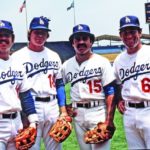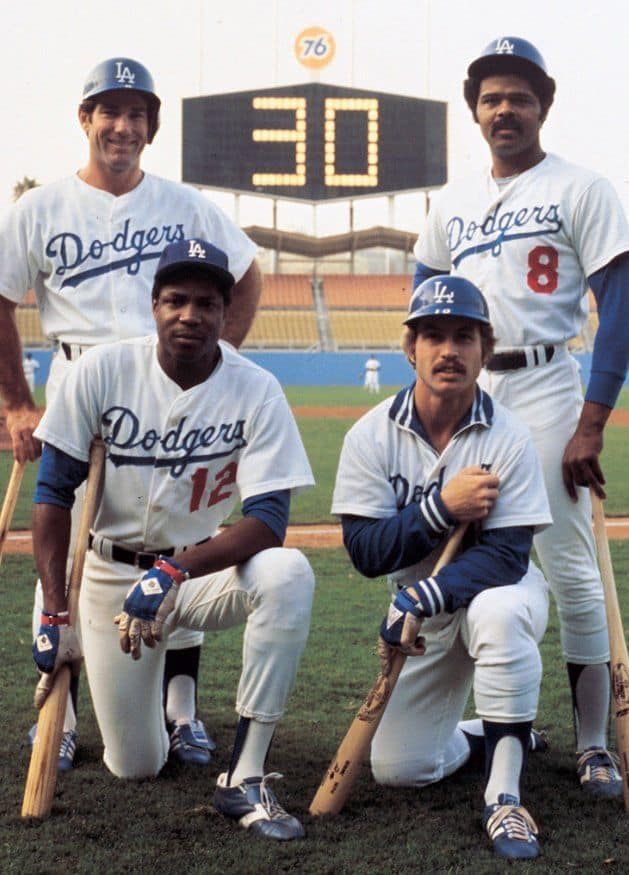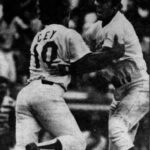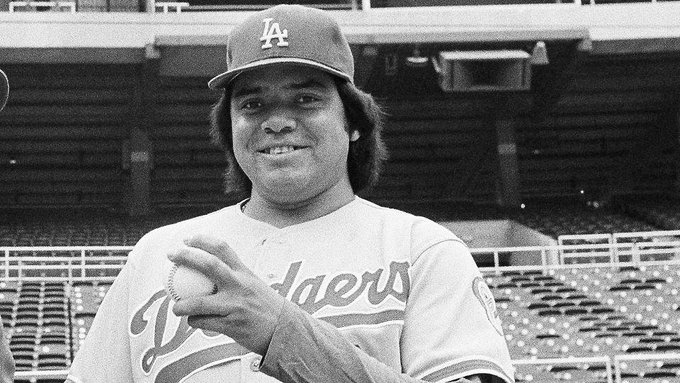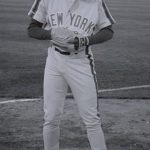Ron Cey Stats & Facts
Ron Cey
Position: Third Baseman
Bats: Right • Throws: Right
5-10, 185lb (178cm, 83kg)
Born: February 15, 1948 in Tacoma, WA us
High School: Mount Tahoma HS (Tacoma, WA)
Schools: Western Washington University (Bellingham, WA), Washington State University (Pullman, WA)
Debut: September 3, 1971 (13,178th in major league history)
vs. CIN 1 AB, 0 H, 0 HR, 0 RBI, 0 SB
Last Game: July 12, 1987
vs. MIL 3 AB, 0 H, 0 HR, 0 RBI, 0 SB
Full Name: Ronald Charles Cey
Nicknames: Penguin
Pronunciation: \SAY\
View Player Info from the B-R Bullpen
Nine Players Who Debuted in 1971
Chris Speier
Chris Chambliss
Ron Cey
George Hendrick
Dave Kingman
Jon Matlack
Doyle Alexander
Cecil Cooper
Darrell Porter
The Ron Cey Teammate Team
C: Steve Yeager
1B: Steve Garvey
2B: Davey Lopes
3B: Carney Lansford
SS: Bill Russell
LF: Dusty Baker
CF: Jimmy Wynn
RF: Reggie Smith
DH: Mark McGwire
SP: Don Sutton
SP: Tommy John
SP: Fernando Valenzuela
SP: Rick Sutcliffe
SP: Dave Stewart
RP: Lee Smith
RP: Tommy Lasorda
Notable Events and Chronology for Ron Cey Career
Biography
Part of the Los Angeles Dodgers infield of the 1970s and early 1980s that remained together as starters longer than any other major league infield, Ron Cey made key contributions to five division-winning teams and one world championship club during his 17-year career. A product of the Dodger farm system, the hard-hitting third baseman teamed up with first baseman Steve Garvey, second sacker Davey Lopes, and shortstop Bill Russell for eight and a half years to give Los Angeles the most enduring infield in major league history. The four men helped the Dodgers win four National League pennants and one World Series between 1974 and 1981, before Cey helped lead the Chicago Cubs to within one victory of the 1984 league championship. Along the way, Cey earned six All-Star nominations and one World Series MVP trophy, while hitting 316 career home runs.
Biography:
Born in Tacoma, Washington on February 15, 1948, Ronald Charles Cey attended Washington State University, where he starred in baseball before being selected by the Los Angeles Dodgers in the third round of the 1968 amateur draft. Cey spent most of the next five years in the minor leagues, reaching the Dodgers’ Triple-A affiliate in Spokane by 1971. While at Spokane, the right-handed hitting third baseman played alongside several other Dodger prospects that eventually joined him in Los Angeles, including Davey Lopes, Joe Ferguson, Tom Paciorek, Von Joshua, and Bobby Valentine. Cey also played under future Dodger manager Tommy Lasorda, who nicknamed the 5’10”, 185-pound infielder “The Penguin” for his slow, waddling running gait.
After making brief appearances with the Dodgers in both 1971 and 1972, Cey joined Los Angeles for good at the start of the 1973 campaign. Replacing Steve Garvey, who moved over to play first base, as the team’s regular third baseman, Cey appeared in 152 games, hitting 15 home runs, driving in 80 runs, scoring 60 times, batting .245, and leading all N.L. third basemen with 328 assists. Cey improved upon his offensive numbers considerably the following year, hitting 18 homers, knocking in 97 runs, scoring 88 others, and batting .262, while also compiling 365 assists at third base for the National League champions. Cey’s strong performance earned him the first of his six consecutive All-Star nominations.
Cey posted solid numbers for the Dodgers in each of the next two seasons as well, hitting 25 home runs, driving in 101 runs, and batting .283 in 1975, before hitting 23 homers, knocking in 80 runs, and batting .277 the following year. He compiled those numbers despite playing his home games in Dodger Stadium, a ball park generally considered to be somewhat unfavorable to hitters.
After Tommy Lasorda replaced longtime Dodger skipper Walter Alston as the team’s manager prior to the start of the 1977 season, he moved Cey up from the number five spot in the batting order into the cleanup position. Thriving in his new role, the third baseman established career highs by hitting 30 home runs and driving in 110 runs. Cey’s 30 homers enabled him to join Garvey, Reggie Smith, and Dusty Baker as a member of the first quartet of teammates to reach the 30-homer mark in the same season. Although Cey batted just .241 on the year, his 93 bases on balls allowed him to compile a very respectable .347 on-base percentage. Cey’s outstanding production, coupled with the Dodgers’ first-place finish in the N.L. West, enabled him to finish eighth in the league MVP voting. The slugging third baseman then batted .308 against the Phillies in the NLCS, with one homer and four RBIs, helping the Dodgers to dispatch of the Eastern Division champions in four games. Although Cey subsequently batted just .190 against the Yankees in a losing effort during the World Series, he hit one home run and knocked in three runs.
The Dodgers repeated as National League champs in 1978, with Cey once again making major contributions to the success of the team by hitting 23 homers, knocking in 84 runs, batting .270, and walking 96 times. He also hit well during the post-season, posting batting averages of .313 against the Phillies in the NLCS and .286 against the Yankees in the World Series, while combining to hit two home runs and drive in seven runs against the two clubs.
After hitting 28 home runs in each of the next two seasons, Cey had perhaps his finest moment in 1981. Although he batted a career-high .288, the third baseman posted relatively modest numbers during the strike-shortened regular season, hitting only 13 home runs and driving in just 50 runs. He then drove in three runs and batted .278 against Montreal in the NLCS, before exploding against the Yankees in the World Series. Leading a Los Angeles comeback from a two-games-to-none deficit, Cey homered once, knocked in six runs, and batted .350 against New York pitching, to help the Dodgers capture their first world championship since 1965. Taking part in the Dodgers’ Series-clinching Game Six victory after being hit in the head by a Goose Gossage fastball during the previous contest, Cey ended up sharing Series MVP honors with teammates Pedro Guerrero and Steve Yeager.
Cey remained in Los Angeles one more year, before being traded by the Dodgers to the Chicago Cubs at the conclusion of the 1982 campaign. He spent the next four years in Chicago, averaging 24 homers and 83 RBIs the first three seasons, while helping the Cubs capture the N.L. East title in 1984 by hitting 24 homers and driving in 97 runs. Injuries and advancing age limited Cey to only 97 games in 1986, prompting the Cubs to part ways with the 38-year-old third baseman at season’s end. After being dealt to the Oakland A’s prior to the start of the 1987 campaign, Cey finished out his career as a part-time player with the team, batting just .221 and hitting only four home runs in his 45 games with Oakland. He retired at mid-season, after being released by the club on July 15. Cey ended his career with 316 home runs, 1,139 runs batted in, 977 runs scored, 1,868 hits, a .261 batting average, and a .354 on-base percentage. He surpassed 20 homers on 10 separate occasions, failing to reach that mark only during the strike-shortened 1981 campaign between 1975 and 1985. Cey also knocked in more than 100 runs twice, driving in at least 90 runs three other times. He finished in the league’s top five in home runs twice, and in runs batted in and walks three times each. Although not very fast, Cey had good range and sure hands at third base, placing among the top three players at his position in putouts seven times, while also finishing in the top three in assists on 10 separate occasions.
Following his playing career, Cey returned to the Dodger organization, working in various capacities in the area of community relations.
@ET-DC@eyJkeW5hbWljIjp0cnVlLCJjb250ZW50IjoicG9zdF90YWdzIiwic2V0dGluZ3MiOnsiYmVmb3JlIjoiTGVhcm4gTW9yZSBhYm91dCB0aGUgdGVhbXMsIHBsYXllcnMsIGJhbGwgcGFya3MgYW5kIGV2ZW50cyB0aGF0IGhhcHBlbmVkIG9uIHRoaXMgZGF0ZSBpbiBoaXN0b3J5IC0gLSAtIC0gLSAtIC0gIiwiYWZ0ZXIiOiIiLCJsaW5rX3RvX3Rlcm1fcGFnZSI6Im9uIiwic2VwYXJhdG9yIjoiIHwgIiwiY2F0ZWdvcnlfdHlwZSI6InBvc3RfdGFnIn19@
Factoids, Quotes, Strange Things
Best Season, 1979
The Dodgers lost the division title to the Reds, but Cey wasn’t the reason. He posted a .499 SLG mark and a .389 OBP. His performances in 1975, 1976 and 1981 were very similar.
Awards and Honors
1981 ML WS MVP
Post-Season Appearances
1974 National League Championship Series
1974 World Series
1977 National League Championship Series
1977 World Series
1978 National League Championship Series
1978 World Series
1981 National League Championship Series
1981 World Series
1984 National League Championship Series
Factoid
Cey had a .531 slugging percentage against lefties and .428 versus righties. Over that same stretch, Cey blasted the Cincinnati Reds for a .316, 14 homers, 38 RBI, and a .648 SLG in 55 games.
Home Run Facts
Cey belted 316 home runs, 210 of which came against RHP, and 106 off lefties. He hit 166 at home and 150 on the road. He slugged seven grand slams, 47 three-run homers, and 87 two-run blasts, while he hit 175 solo shots; 17 times he blasted two Hr in one game, but he never hit three in a contest. He actually hit one inside-the-park homer, in 1983 for the Cubs. Cey hit home runs in 15 different ballpraks, and his first dinger came off Mike Caldwell on September 26, 1972.
Matchup Data
Cey performed well against Tom Seaver, belting eight homers off the right-hander during his career, and posting a slugging average over .500 against him.
All-Star Selections
1974 NL
1975 NL
1976 NL
1977 NL
1978 NL
1979 NL
Largest Strength as a Player
Power
Largest Weakness as a Player
Baserunning
Learn More about Ron Cey
RBI – Cey
In April 1977, Cey set a NL record when he drove in 29 runs. His hot start helped the Dodgers bolt to a 17-3 record under rookie manager Tommy Lasorda. In 1985, Dale Murphy tied Cey’s RBI mark and in 1994 Andres Galarraga broke it. Cey finished the ’77 season with a career-high 110 RBI, despite a .450 SLG percentage, one of the lower marks of his prime years.
Four x 30
On the last day of the 1977 season Dusty Baker hit his 30th home run. He joined Cey (30), Steve Garvey (33) and Reggie Smith (32) on the Dodgers with 30 or more homers. The 1977 Dodgers were the first team to have four men reach 30 dingers


